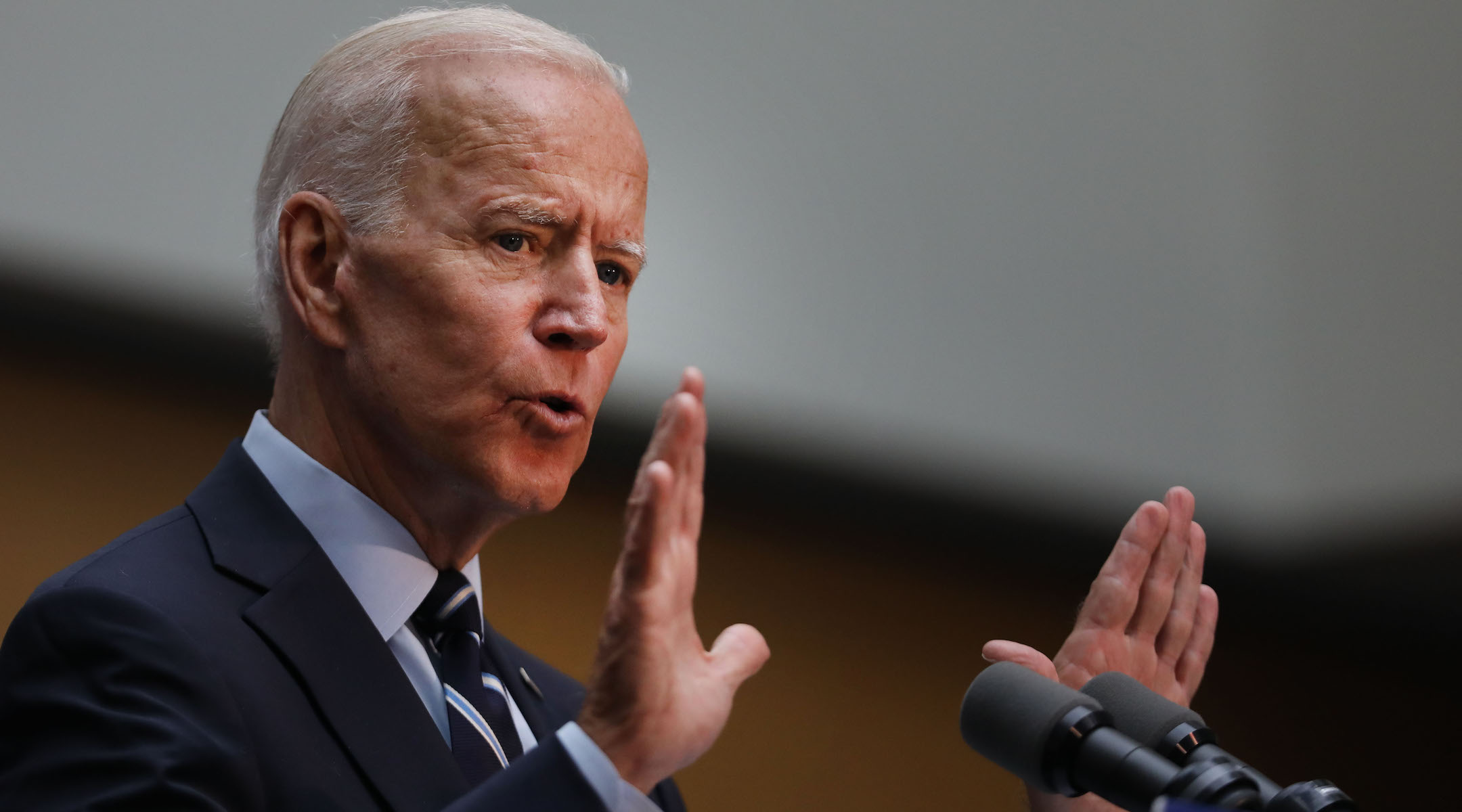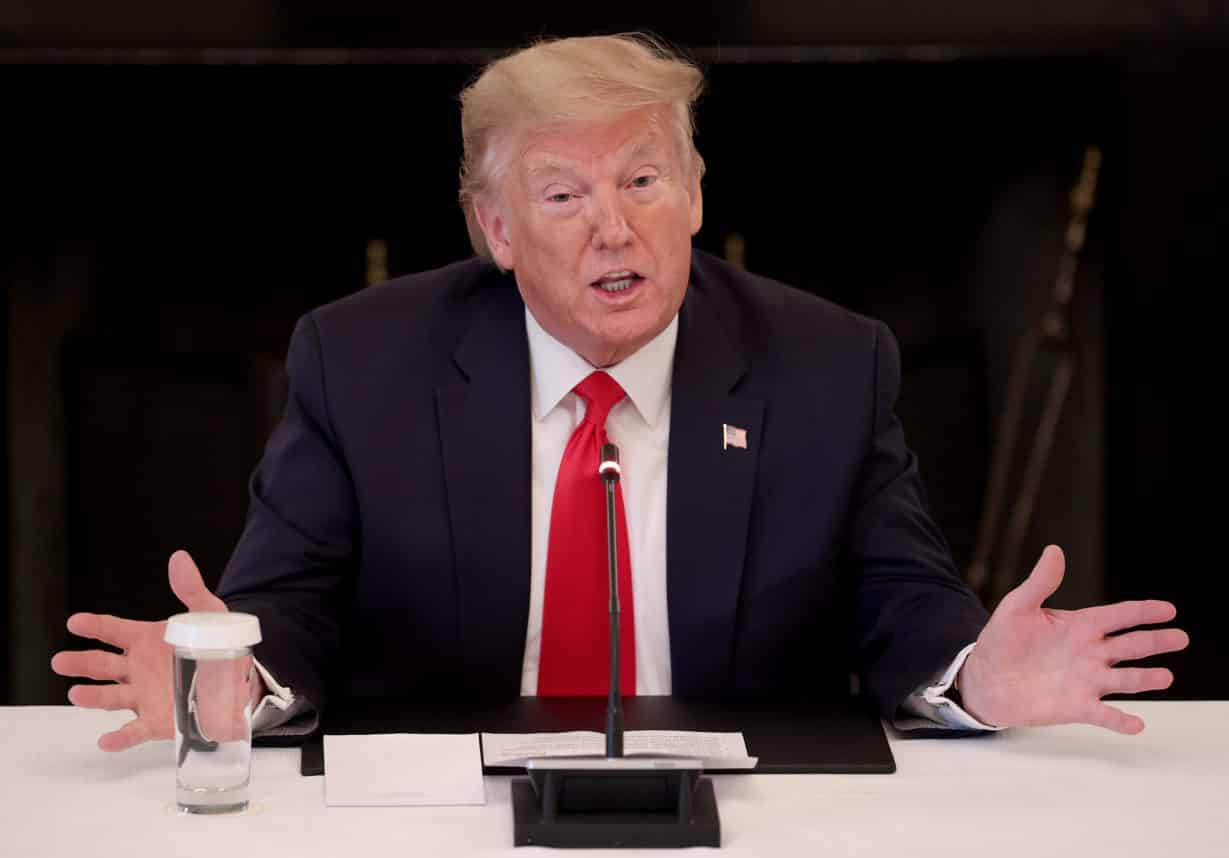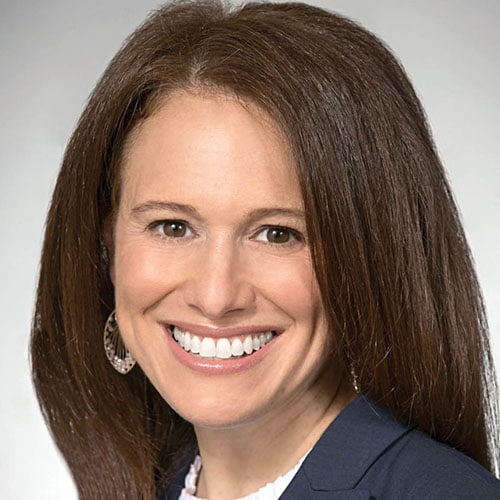 Former Vice President Joe Biden gives a speech on his foreign policy plan in New York City, July 11, 2019. (Spencer Platt/Getty Images)
Former Vice President Joe Biden gives a speech on his foreign policy plan in New York City, July 11, 2019. (Spencer Platt/Getty Images) In less than six months, we Americans will face the most important election of our lifetimes, which will determine the character of our nation and the trajectory of our future. Voters will choose between more of the same with Trump, or change consistent with our values.
The two options are clear; both President Donald Trump and former Vice President Joe Biden have long records. However, only Trump has failed the Jewish community and all Americans by presiding over a period of rising anti-Semitism and violence targeting Jews, including two deadly attacks on synagogues in recent years. Only Trump recently referred to armed extremists with swastikas as “very good people,” just as he referred to neo-Nazis – and those peacefully protesting them – as “very fine people” less than three years before. And only Trump failed to prepare for the biggest public health crisis in modern history, which has led to unprecedented unemployment, death and devastation.
Make no mistake: Trump’s presidency has been dangerous for all Americans, but especially American Jews − and we cannot afford four more years.
This election is a referendum on Trump, whose rhetoric and policies have weakened the security of American Jews and Israel.
This election is a referendum on Trump, whose rhetoric and policies have weakened the security of American Jews and Israel. If Republicans, including the Republican Jewish Coalition (RJC), were honest with their supporters, they would say the same thing the RJC Chair wrote about Donald Trump in March 2016, before Trump won the Republican nomination: “I also won’t vote for Donald Trump because of who he is. A bigot. A misogynist. A fraud. A bully.”
Clearly, the RJC was willing to compromise by supporting Trump in the last election, despite the fact that 70% of American Jews chose not to support him. Jewish voters likely will overwhelmingly reject Trump again in 2020, and the reasons are twofold. First, more than two-thirds of Jewish voters disapproved of Trump’s performance as of February, and those numbers are likely higher today given his failure of leadership surrounding the coronavirus. Second, Biden aligns with the Jewish community on all the top policy priorities of Jewish voters: access to affordable healthcare (90%); protecting Medicare and social security (88%); improving the economy and creating jobs (87%); combatting anti-Semitism (86%); and enacting gun safety laws (85%).

Sadly, these last two issues are connected, as we’ve seen white nationalists storm our synagogues with assault weapons. According to a 2019 poll by Greenberg Research, nearly three-quarters of Jewish voters feel less secure than they did two years ago, and more than half blame Donald Trump, at least partially, for contributing to the anti-Semitic attacks in Poway and Pittsburgh. This trend only continues to worsen. Earlier this week, the Anti-Defamation League (ADL) reported that anti-Semitic incidents in the U.S. reached an all-time high in 2019.
The Jewish vote largely is driven by domestic policy issues rooted in our values, including social justice and equality, which have been threatened by the Trump administration and the Republican-controlled Senate.
The Jewish vote largely is driven by domestic policy issues rooted in our values, including social justice and equality, which have been threatened by the Trump administration and the Republican-controlled Senate. Importantly, this doesn’t mean Jewish voters don’t care about Israel. To the contrary, 91% of Jewish voters consider themselves pro-Israel, according to a recent poll by the Jewish Electorate Institute. On this issue, they likely will choose Biden, whose record as a policymaker is longer than any presidential candidate in U.S. history.
Biden’s commitment to Israel is deep and personal. And it’s personal for me, too. I served as foreign policy adviser for Biden’s two successors: Delaware Senators Ted Kaufman and Chris Coons, who both served on the Senate Foreign Relations Committee, which Biden previously chaired. Years later, while serving in the Obama administration, I learned firsthand that when it comes to Israel, no one’s experience matches the breadth and depth of Biden’s.

Less than a month before the 2016 election, then-Vice President Biden spoke at my synagogue at an event honoring the life of former Israeli Prime Minister Shimon Peres. Biden’s speech was memorable not just because he beautifully eulogized his friend of more than 45 years, but because in doing so, he revealed the sincerity of his commitment to Israel.
Standing before the Washington Jewish community, Biden affirmed, “I learned a long time ago when I said I am a Zionist, and was criticized for it, that you don’t have to be a Jew to be a Zionist … . It’s how we make real that sacred moral obligation of ‘never again’ – Israel.” With these words, Biden explained he’s a Zionist not because of political calculation or convenience. He is a Zionist because he understands the deeper meaning of the Golda Meir story he loves to retell – Israel faces existential threats, and its secret weapon is that there is nowhere else to go.
Biden explained he’s a Zionist not because of political calculation or convenience. He is a Zionist because he understands the deeper meaning of the Golda Meir story he loves to retell — Israel faces existential threats, and its secret weapon is that there is nowhere else to go.
By now, most Americans are aware Biden prefaces his stories – and any assertion of unvarnished truth – by offering “his word, as a Biden.” It’s authentic and compelling, but when it comes to Biden and Israel, you don’t have to take his word. Look at this record.
Biden first traveled to Israel in 1973, and has called U.S. military assistance to Israel “the best $3 billion investment we make.”
One might think this was an applause line in a carefully scripted speech before AIPAC, but it actually was an assertion Biden made extemporaneously on the Senate floor in 1986, while debating Reagan’s proposed sale of advanced weapons to Saudi Arabia. Biden opposed the sale in part because of his concerns about Israel’s security, telling his colleagues, “I think it’s about time we stop … apologizing for our support of Israel. There’s no apology to be made. None. … Were there not an Israel, the United States would have to invent an Israel to protect her interests in the region.”
As vice president, Biden helped to shape and secure the 10-year, $38 billion memorandum of understanding between the Obama administration and Israel, the largest in U.S. history. This agreement included lifesaving anti-rocket and missile defense systems, such as David’s Sling, Arrow 3 and Iron Dome. This wasn’t just Biden’s policy while serving in the White House. Biden recently expressed his support for Israel’s right to self-defense when it was under attack by rockets from Gaza and had to deploy the Iron Dome.
Trump’s presidency has been dangerous for all Americans, but especially American Jews — and we cannot afford four more years.
In 2019 and early 2020, amid a crowded Democratic presidential primary that included debate around aid to Israel, Biden was unequivocal. He consistently has opposed conditioning aid to Israel based on the policies of any particular Israeli government. He recently said that leveraging U.S. aid toward Israel in response to settlement expansion would be “a gigantic mistake” and “absolutely outrageous.”
Biden, just like the majority of American Jews, understands that a two-state solution is essential to Israel’s survival as a Jewish, democratic state. Biden has said he would leave the U.S. Embassy in Jerusalem and that he opposes unilateral actions by either side that would permanently impede prospects for two states, including unilateral Israeli annexation of parts of the West Bank.
Biden, just like the majority of American Jews, understands that a two-state solution is essential to Israel’s survival as a Jewish, democratic state.
He criticized Trump’s erratic decision to withdraw U.S. troops from Syria, which created a vacuum of leadership exploited by Iran and ISIS on Israel’s northern border. In response to this policy, Biden didn’t mince words; he said that Trump “sold out” the Kurds. The Israelis felt the same way. Israeli officials were concerned about Trump abandoning our allies, and thought Israel might be next after this occurred.
The Israeli government also was concerned when the Trump administration blocked security assistance to the Palestinian Authority in 2019. When President Trump learned about Israel’s concerns, he reportedly said that if this counter-terror assistance was that important to Israel, Prime Minister Netanyahu should “pay for it himself.” Biden supports a continuation of this mutually beneficial security assistance, in accordance with the Taylor Force Act, which explicitly prohibits the use of funds to support families of Palestinian terrorists.
Leadership requires action, and Biden has a plan to improve the security of American Jews and Israel. Perhaps most importantly, he has vast experience to draw on. For Jewish Americans, the choice in this election could not be clearer. Donald Trump is the biggest threat to American Jews, and Biden is a trusted friend of our community and steadfast ally of Israel.
At the 2016 event honoring Shimon Peres, Biden reminded us to “cast off the constraints of the past and look toward tomorrow.” That’s how Jewish voters are approaching this election – Biden represents change consistent with our values, which is exactly the kind of change we need.
Halie Soifer is the executive director of the Jewish Democratic Council of America. Previously, she served as a national security adviser in the Senate, House and the Obama administration.























 More news and opinions than at a Shabbat dinner, right in your inbox.
More news and opinions than at a Shabbat dinner, right in your inbox.